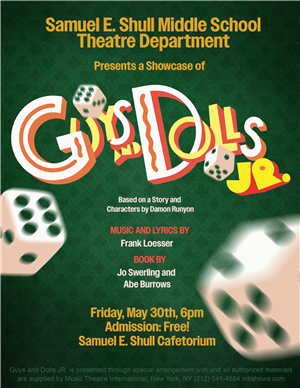Mr. Costello

-
Hello, my name is Mr. Costello and I am overjoyed to be your student’s Theater Arts teacher this year! I also serve as the Play Director/Producer for our school’s Theater Production. I am beyond excited about the opportunity to resume performances this upcoming school year. I believe theater is a powerful tool for us to utilize in bringing our community together.
Below are the class expectations for Theater Arts. In Google Classroom, students will gain access to daily lessons, assignments, and resources. Your child is to join their designated Theater Arts Google Classroom. It is my expectation that all students will try their personal best in class.
NJ Arts Standards: Create, Perform, Respond, Connect
If you have any questions throughout the school year, please contact me by email at: jamecostello@paps.net
Thank you,
Mr. Costello
-
District Grading Policy
60% Assessments
35% Classwork
5% Homework
Spring Musical Showcase 2025: Guys and Dolls JR.

Spring Musical 2024: James and the Giant Peach JR.

Spring Musical 2023: Newsies JR.
Spring Musical 2022: Descendants

-
Watch our previous Spring Musicals! Productions archived by our wonderful Video Production students lead by Mrs. Lin: https://www.paps.net/Page/26308
-
Why Theater?
Having a regular creative outlet is not just part of a well-rounded education – it is essential for a child’s emotional health and well-being. Producing a show brings the arts together and provides growth opportunities for all varieties of learners. For example, kinesthetic learners engage their bodies through dance, linguistic learners dive into the written and spoken word, spatial learners tackle set and costume design, and musical learners revel in the show’s score. Besides being incredibly fun, musical theater helps young people develop many of the skills necessary for success in today’s world:
Self-Confidence: Throughout the rehearsal and performance process, young performers discover how to take creative and emotional risks and learn to trust their abilities.
Literacy: Students increase reading and writing skills at their own pace by immersing themselves in the story, reading and re-reading their scripts, memorizing their lines, and taking notes at rehearsal.
Communication: During rehearsals, students learn how to articulate their thoughts and questions and carefully listen to direction in order to improve their performances.
Imagination: Theater is most dynamic when the imaginations of its participants are fully engaged. Students make countless interpretive choices in design and performance to create a detailed, fictional world for their audiences.
Empathy: Through character work and story creation, young performers explore the lives of others. First-hand perspectives of new circumstances challenge prejudices and aid in the development of well-rounded students and citizens.
Critical Thinking and Problem Solving: The amount of work required to successfully put on a show makes all participants valuable troubleshooters. Whether inventing mnemonics to remember lines, adjusting staging to show off everyone’s faces, or mastering a tricky scene change, students have countless opportunities to creatively tackle challenges.
Self-Discipline: Through prompt attendance at rehearsals and learning lines, music and choreography on schedule, students acquire valuable self-discipline techniques and become reliable and trustworthy members of an ensemble.
Community Awareness: A theatrical production provides ample opportunities to connect with our families and neighbors. Students can engage parents, community centers, and local vendors to help create sets, props, costumes and publicity.
Public Speaking: Whether performing for their peers during rehearsal or for their school and local community during a performance, students gain expertise and confidence speaking in front of a group.
Curricular Integration: A musical provides a rich and engaging springboard for students to explore many subjects in their classrooms and discover connections among various modes of learning.
Teamwork: Theater requires extensive creative input from all its participants. Students build ensemble by working together to rehearse, construct, promote, and perform their show. Every role – whether onstage or behind the scenes – is vital for the show’s success.

